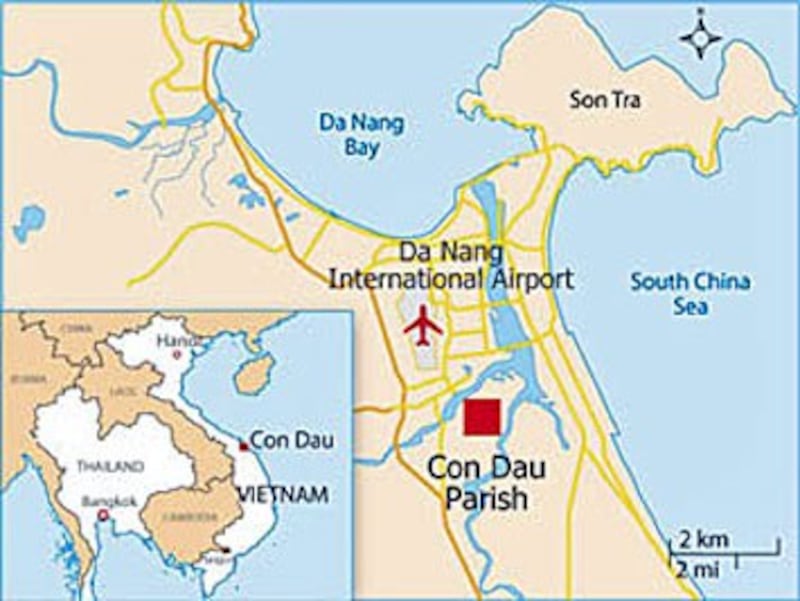Authorities in central Vietnam’s coastal city Danang on Friday ordered the detention of at least 10 protesters who opposed being forcibly evicted from their homes in the latest development in a long-running land grab case in Con Dau parish, one of the evictees told RFA’s Vietnamese Service.
About 500 people, including policemen and security guards, were mobilized along with an ambulance, a fire truck, and a digger to forcibly evict seven families and demolish their homes in the Catholic community in Cam Le district to make way for an ongoing ecotourism development project, said evicted resident Huynh Ngoc Truong.
“Two families including at least 10 people were detained,” he said.
The families say they have been shortchanged on the compensation that officials have offered them for their homes and the land on which they cultivate rice.
They have been offered 50,000 dong (U.S. $2.14) per square meter for farmland, though officials have resold the plots to developers for 20 million-40 million dong (U.S. $856-$1,712) per square meter, Truong said.
“My family has 7,000 square meters of farmland and 1,600 square meters of housing,” he said, but did not state the amount of money he had been offered.
Danang officials have offered new settlements to the parishioners, but many do not want to move to the sites, preferring instead to relocate to an area near their church, Truong said.
On Thursday, national radio broadcaster Voice of Vietnam and daily state newspaper Tuoi Tre quoted parish officials as saying that the compensation amount should be enough for residents to be able to move and for those who have already relocated to new settlements to have better lives.
Those arrested are part of a larger group of 100 remaining families in the parish who have been slated by officials for relocation to make way for the Hoa Xuan urban ecological zone.
The development project was initiated in 2008 with investment from the privately-owned Vietnamese real estate developer Sun Group after the Danang government decided to expropriate the land of Con Dau parish a year earlier and to demolish all houses there.
At that time, officials asked about 400 families from the parish to move out so the land on which their homes sat could be leased to the investor. But the residents opposed the project, citing inadequate compensation and housing alternatives in a distant location.
They were also rattled by the idea of having to abandon the parish cemetery, a national culture heritage site, which authorities later demolished and removed to a remote area.

Violent clash with police
Though many of the 400 families did not want to move and complained that the compensation offered to them was not enough, some of them agreed to relocate, while others fled to Thailand after a violent clash with police in 2010.
In October of that year, Vietnamese authorities sentenced two people to jail for clashes over the land dispute between residents and Con Dau parish authorities that highlighted alleged police brutality and religious persecution.
A Danang court ordered one resident to 12 months in jail on accusations that he led a May funeral protest that sparked the confrontation between villagers and police. He was one of six people held without trial by police for their roles in the protests.
A female resident received nine months in jail for "throwing dirty stuff" at police during the cemetery clashes at the funeral of an 82-year-old woman. Police prevented the burial because the land was to be transferred for the ecotourism project.
Four others, also convicted for alleged offenses at the funeral protests, were given suspended nine-month jail sentences and were released and placed under probation.
The U.S. Commission on International Religious Freedom (USCIRF), a religious watchdog set up by U.S. law, called for the unconditional release of those arrested after its staff conducted interviews with Con Dau residents and found "credible evidence of intimidation, harassment, restrictions on peaceful religious ceremonies, and torture in detention."
Hundreds of residents later left the parish in 2013 on account of threats and the forced destruction of some of their homes, as land use rights were reportedly being sold by lots to private individuals, according to a statement issued in March 2014 by the U.N.’s human rights office (OHCHR).
The Danang government gave the remaining hundred or so families a deadline of April 15, 2014, to forfeit their land and move, while the compulsory demolition of homes continued.
U.N. human rights experts took up the plight of the Con Dau residents and called on the Vietnamese government to intervene in the forced evictions of the last remaining residents.
“This appears to be a clear case of land grabbing for the benefit of private entrepreneurs and at the expense of local communities,” Raquel Rolnik, the U.N. special rapporteur on the right to housing, said in a statement at the time.
Reported by RFA’s Vietnamese Service. Translated by Viet Ha. Written in English by Roseanne Gerin.
